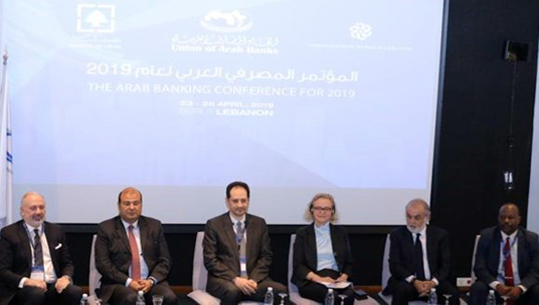Dr. Khalid Hanafy, the Secretary General of the Union of Arab Chambers, participated in the third day of the Arab Banking Conference, in the presence of the Executive Chairman of the General Authority for Investment and Free Zones in Egypt, Dr. Mohsen Adel Helmy, in addition to a prominent participation from the Arab Republic of Egypt and many Arab countries.
Wissam Fattouh, the Secretary General of the Union of Arab Banks, said in his speech at the opening of the third day of the Arab Banking Conference that "the basis of economic reform is governance," pointing out that "one of the most important challenges for financial affairs is the financial culture and it must be added to the curriculum”.
The first working session entitled "The Role of Public-Private Partnerships in the Development of Arab Economies" was chaired by Ziad Hayek the Vice President of UNECE, Geneva, who noted in his speech that "the infrastructure is the only sector which can create big jobs quickly."
Dr. Khaled Hanafy, UAC’s Secretary-General, said in his speech that "in order to achieve development and provide prosperity for the Arab peoples, it is necessary to find a new way to provide adequate funding for development," noting that "the Arab private sector currently contributes with about 75 percent of GDP."
He also pointed out that "the success of any development policy needs to reconcile the interest of the private sector and the interest of society, and here comes the role of the body that draws the economic policy, through the development of laws that contribute to the national interest and the interest of the Arab peoples."
Dr. Hanafy added: "most of the Arab countries suffer from problems in the infrastructure, and based on that, it is very urgent to draw policies that contribute to the public good, knowing that there are models have succeeded and there are also countries were able to achieve development, but despite all this, the only password which remains for achieving partnership is to take into account the interest of all parties, and in this sense, the door must be opened to the private sector to play its role to the fullest, which helps in achieving the benefits and gains that correspond to the public interest, otherwise the result will ultimately not achieve the need".
He also stressed that "the partnership between the public and private sectors is no longer an area of discussion but a necessary and urgent need. Models exist both in the world and in the Arab countries, and the Arab Republic of Egypt, for example, has managed to achieve a significant leap in the electricity and infrastructure sectors."
Dr. Hanafy concluded "despite the need for transparency and governance, the objective of investment is to achieve revenue, and this needs to change the mindset by developing more flexible laws that will contribute to development through public-private partnerships".
Source: Union of Arab Chambers

